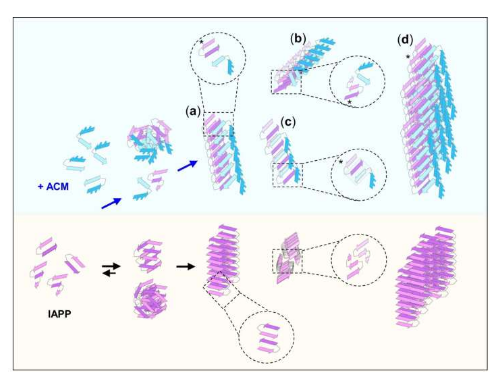New synthetic peptides against Alzheimer's disease and type 2 diabetes
Abstract:Scientists from the Technical University of Munich and other institutions have developed mini proteins, known as peptides, that bind to the specific proteins that form amyloid and prevent them from clumping together to form cytotoxic amyloid.
Key words:Alzheimer's disease, type 2 diabetes, Amyloid protein, synthetic peptides
In Alzheimer's disease, the deterioration of brain cells is directly linked to the accumulation and formation of deposits of toxic proteins called amyloid plaques, a similar process that also plays a role in type 2 diabetes.Recently, One paper was published in the international journal Nature Communications entitled "Designed peptides as nanomolar cross-amyloid inhibitors acting via supramolecular In nanofiber co-assembly, scientists from the Technical University of Munich and other institutions have developed mini proteins, known as peptides, that bind to specific proteins that form amyloid and prevent them from clumping together to form cytotoxic amyloid.

Targeting the formation of harmful amyloid aggregates may be a potential approach. In this study, researchers developed a new class of synthetic peptides that block the accumulation of toxic amyloid proteins associated with Alzheimer's disease and type 2 diabetes in experimental models.Previous research indicate that specific "cross-interactions" between amyloid proteins in the two diseases may significantly accelerate the aggregation process, which may help explain why patients suffering from one of the two diseases may be at increased risk for the other.
Cross-reactivity between amyloid proteins
The researchers developed novel synthetic peptides that act as effective inhibitors of amyloid aggregation in both diseases, Kapurniotu said. In fact, the peptides were designed to bind to amyloid proteins associated with both diseases and effectively inhibit cytotoxic amyloid aggregation and cross-accelerating amyloid interactions.In addition, although the peptides involved interact with amyloid proteins to form mixed aggregates that look very similar to deleterious amyloid proteins, they have no cytotoxic effects at all. Moreover, these amyloid-like mixed aggregates can also be absorbed by phagocytic immune cells more efficiently than amyloid aggregates.
Now that there is growing evidence that Alzheimer's disease and type 2 diabetes are linked, the peptides designed here could be a valuable candidate to help develop new drug therapies to treat the disease. The researchers have now filed a patent application, and plan to further their research to translate the results from the experimental model into the clinic.
Read Related Articles:
Copyright © 2020 Omizzur Inc | Terms & Conditions | Privacy Notice | Sitemap